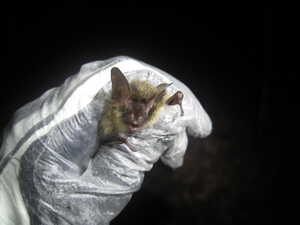Northern Long-eared Bat Moves From Threatened to Endangered
MONTPELIER, Vt. — The U.S. Fish and Wildlife Service's reclassification of the northern long-eared bat from threatened to endangered status came into effect Friday, March 31, 2023.
In Vermont, the northern-long eared bat received a state endangered status in 2011 due to rapid and drastic declines caused by the deadly fungal disease white-nose syndrome. It received federal threatened status in 2015 after the disease had spread throughout the Northeast, but not the entire range of the species.
Following white-nose syndrome's expansion across the United States and Canada, the northern long-eared bat has experienced similarly dramatic population declines throughout most of its range. In Vermont, this once-common species of mature forest habitats has declined by 98 percent in the underground hibernation sites where it overwinters. The USFWS' reclassification comes in response to this trend.
In anticipation of the reclassification to federal endangered status coming into effect, the USFWS released a planning tool and interim guidance earlier this month. These resources cover potential impacts to development, infrastructure, and land management projects in the northern long-eared bat's range that require federal approval, have received federal funding, or are carried out by a federal agency starting in April 2023. Non-federal projects will also be able to evaluate potential impacts to the northern long-eared bat with the USFWS planning tool.
The USFWS is expected to issue final guidance by April 2024. In addition, the reclassification may impact the buffer distances around known northern long-eared bat hibernacula and roosts in Vermont.
The Vermont Fish and Wildlife Department and partners have been proactive in tracking the state's northern long-eared bat population and implementing protections like the 2011 state endangered designation. Because of this advance effort, the reclassification to federal endangered status is not expected to have major impacts on Vermont landowners, land managers, or developers.
Tags: endangered,

